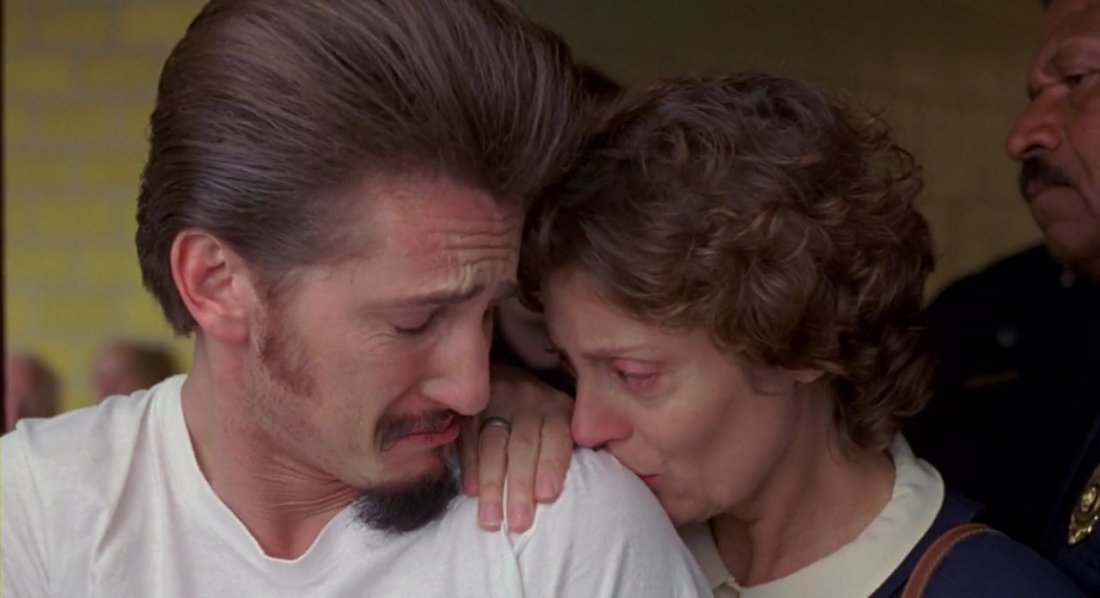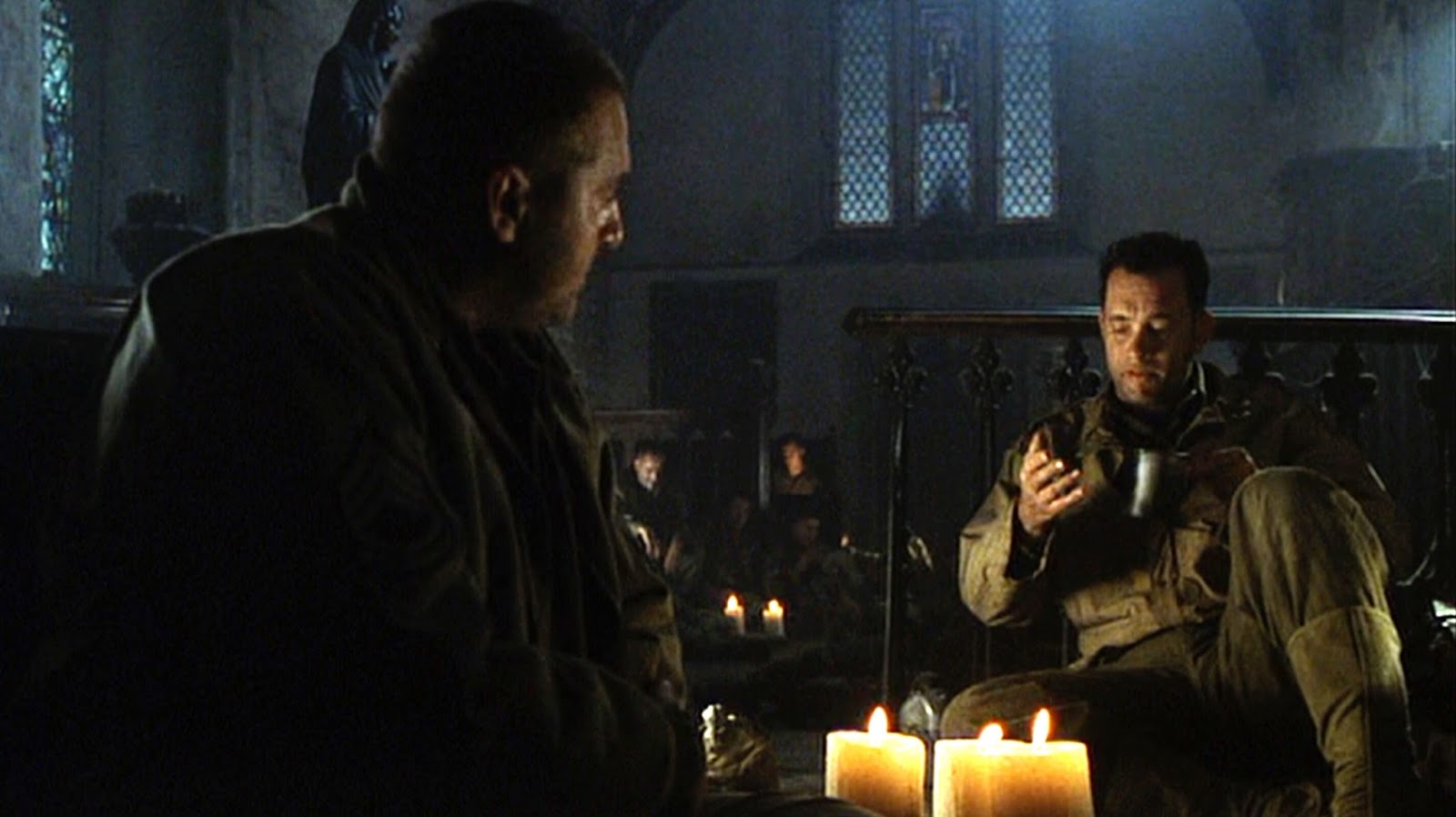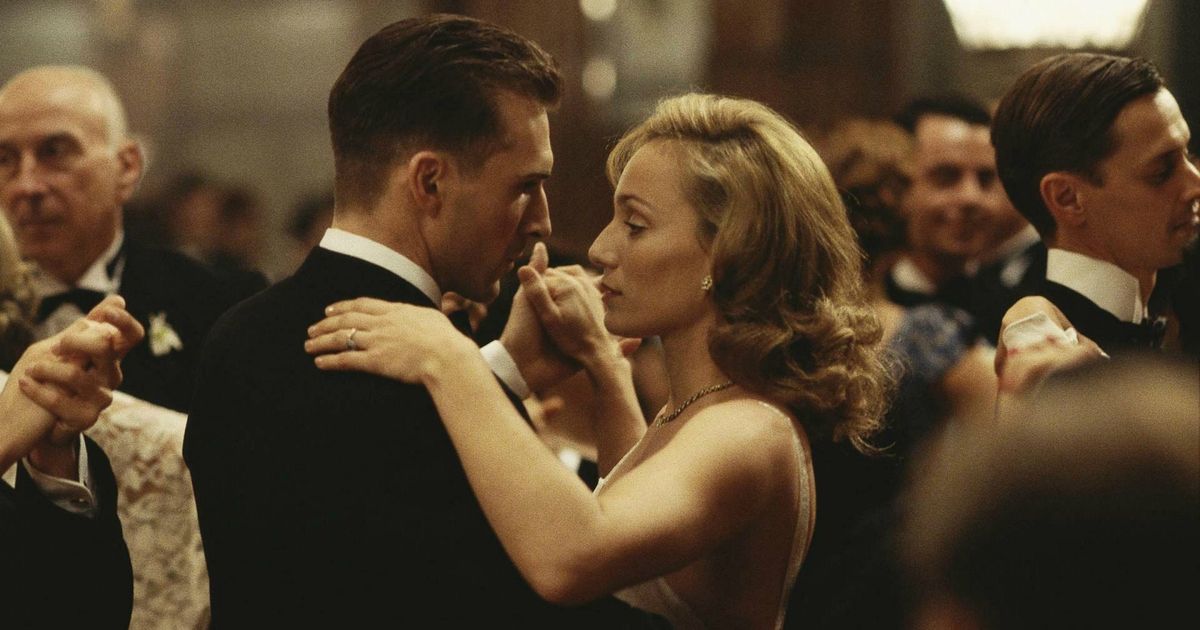There is no reason that Dead Man Walking should’ve had a profound impact on my life.
If I hadn’t been a burgeoning young film snob I likely wouldn’t have seen it at all, but when Oscar nominations and buzz came around people were talking about the new film by Tim Robbins that absolutely had to be seen. For some bizarre reason it didn’t manage to get a Best Picture Nomination but both lead actors, Susan Sarandon and Sean Penn, had been nominated along with writer/director Robbins for Best Director. Heck even Bruce Springsteen managed to get a nod for Best Song. The pedigree was there, but the subject matter didn’t really catch me.
Despite dabbling on and off with Christianity and spirituality in high school, it never really caught on for me. I understood the parables behind the stories and commandments, and thought well of many of their decrees, but I couldn’t bring myself to wholly believe in all that was asked of me. I was more a young man of science than I was of faith, so the thought of a film based on a book by a nun, Sister Helen Prejean, wasn’t at the top of my list. Especially since I was a young man who fervently believed that at twenty years old, I knew everything about the world and my mind was already made up, especially concerning the death penalty.
Anyone who committed murder deserved to die. It was written right there in the good book that I didn’t believe in but felt clever enough to quote when the need was there. “Thou shalt not kill.” A commandment couldn’t be any clearer. And to utilize another easily digested but not necessarily understood passage (Leviticus 24:19-21) “And a man who injures his countryman- as he had done, so shall it be done to him, fracture for fracture, eye for eye, tooth for tooth. Just as another person has received injury from him, so it will be given to him.” I’m well aware that our country was not founded under biblical law, but many of the laws since passed have leaned pretty heavily into it. Simply, if you kill, you should be killed.
I didn’t see a problem with this mentality and I was quite certain that Matthew Poncelet would die. Sean Penn, no matter how good his performance in his award worthy breakdown, would not convince me otherwise. His character was never innocent. This wasn’t a story of a wrongfully accused man on death row and I was leary that the film would do it’s best to convince me otherwise so I went in, stomped my feet into the ground, knowing that it wouldn’t move me. Do your best to preach to me Tim Robbins, but don’t expect to sway me.
But damn, did Susan Sarandon sneak right up on me.
To this day I’m not sure if I’ve ever seen a performance so filled with empathy, kindness, and love than I’ve seen her give as Sister Helen Prejean, on whom this story is based. Wide eyed and terrified, Sarandon walked us through what it would be like to not only be so close to a murderer, but to try her best to walk out of the darkness with him. In a truly staggering choice for an award winning performance, she spends the majority of the film listening, not just to Matthew, but to anyone and everyone affected by his crime. When she does speak it’s almost always in an attempt to come to the truth of a situation, a search for greater personal understanding. Not something a cocky young man such as myself was prepared for.
When we first meet her she’s doing the Lord’s work, living among those she’s trying to help in a mostly minority project, surrounded by the impoverished. She’s doing her best to help educate them at the school and to be an overall positive influence. When she’s asked to speak with Matthew on death row, she has no idea what she’s in for but knows in her heart that she needs to be there to help purely because someone asked for it. And as she learns quickly, she doesn’t necessarily need to like someone in order to help them.
Make no mistake, Sean Penn’s portrayal of Matthew Poncelet is a masterclass in unlikeability. Despite being separated by windows and fences, his eyes have a way of penetrating through them, staring past any barrier so that his snake charming voice comes through as clear as his intent. It’s uneasy, yet completely expected when he talks about how the world has done him wrong, or when he casually drops the N word. He’s prideful, not going to kiss anyone’s ass as he puts it, and can easily spout even the harshest of racial rhetoric when given the opportunity. Matthew is mad that he followed his buddy into the woods that night, mad that he got stoned out of his mind, mad that everyone thinks he pulled the trigger, and mad that he is going to die.
It’s easy to get wrapped up in that type of anger. When I first considered the death penalty for a class assignment in high school I let my anger do the thinking. How would I feel if someone close to me was murdered? What would I do to make that right? To paraphrase another 90’s movie, would I become wrath? The angry young man in me was certain that I would. Sister Helen, in all her compassion, certainly wouldn’t be able to convince me to turn the other cheek.
But there is something to be said for vulnerability. There is a moment in the film, many actually, when Sister Helen either admits that she’s scared, in over her head, or doesn’t know what she’s doing. She expresses this to her friends, her family, Matt, and even the families of those murdered. She’s not afraid to put herself out in the open with nothing more than her faith and her love as a shield and work towards better understanding, and this perhaps hits hardest when she speaks with the Percys and The Delacroixs.
It was easy for me to understand the thoughts of the Percy’s. Played by R. Lee Ermey, the hardass drill sergeant from Full Metal Jacket, Clyde Percy wanted Matthew to die. As far as he was concerned no one was there for his daughter when she was face down in the grass being murdered and he is damned sure didn’t want any such comforts going to Matthew. He’s astounded and unsettled that Sister Helen would even consider such a gesture. But even with his anger, she responds in kindness, listens to them, and doesn’t press the matter when they ask her to leave.
As for the Delacroixs, their response was a bit tougher to navigate. We don’t learn much from Mrs. Delacroix because she leaves, doing her best to put everything behind her and move on. (I also love how this film portrays different trauma responses). Earl, played by Raymond J. Berry, is having more trouble with processing his feelings. He sees himself as a man of faith, and after expressing concern that Sister Helen hadn’t met with them before taking on Matthew’s case, allows her to meet with him. He doesn’t know how to go on, but feels better talking about it, both with Sister Helen and a support group. His character is perhaps the most sympathetic of all involved, as he’s tasked with both undergoing a catastrophic trauma and trying to live up to a loving Christ-like ideal. As much as Sister Helen talks the talk, I feel it is Earl that truly walks the walk and it’s impossible not to feel his pain in the closing moments of the film.
While the performances certainly did their job, it’s writer/director Tim Robbins who told the tale the way it needed to be presented, as neutral as possible. Adapting Sister Helen Prejean’s book, which is absolutely enlightening and informative, but too much for a film, was a Herculean task and doing so in a way that doesn’t come across as preachy seemed a near impossible task. He structures the story so that we learn more about the characters than we do the crime, the latter of which is only parcelled out until the end, when the truth will hit with maximum intensity. By that point, Robbins is confident enough that he has presented a story that will have swayed us one way or the other, yet still found resolve in how it ends, that he just lets the story come to its natural conclusion. Somehow he has created a movie that dances through the landmines of religion, politics, race, capital punishment, and the law and allows us to pass through by following the characters, because it’s people that we really want to connect with, it’s their outcomes that matter to us.
That doesn’t mean we aren’t moved by the message though. It’s easy to go into this movie wanting to abolish the death penalty and come out with the same opinion just as it is the inverse. Those found guilty get punished. But this movie requests that we ask more of ourselves, to consider points of view that we had long ignored because they didn’t strengthen our own, and to seek out understanding, to find the humanity in everyone by sharing our stories and listening to others. I truly feel this film sets out to make the world a better place, and from my perspective it did just that.
When I sat down in that darkened, nearly empty theater on Valentines Day 1996, I wasn’t expecting to leave a changed man. Prior to the movie my girlfriend and I had a nice dinner at the fanciest place we could afford (Olive Garden) and as many young men do on that day, I was hoping my efforts to put the young lady in a romantic mood would be successful. To put it simply, that did not happen. She probably shouldn’t have let me pick the movie. It would be easy to place the blame squarely on her shoulders. She knew better, right? Or I probably could’ve done a better job at knowing what it was she would’ve wanted to watch. We could’ve seen Broken Arrow, Mr Holland’s Opus or even Black Sheep. In retrospect all of those choices sound like they would’ve led to a more desirable outcome. Instead I had to have it my way and picked the one movie that drove every ounce of sexuality out of the theater. But I made the choice and the rest of the evening was rather somber and introspective.
Being negatively confronted by our choices isn’t sexy or fun. Watching a film that insists you tackle a topic that you’re not emotionally ready for is rough. When it comes to the death penalty, there is no easy answer. Make up your mind one way and moments later there can be a compelling argument in the opposite direction. Given a second to reflect upon your choice and its consequences, intended or otherwise, can lead to a feeling of complete hopelessness. How am I expected to make those difficult life and death decisions when picking an appropriate date movie is obviously too difficult for myself? I wasn’t old enough to drink at the time, but yet I was old enough to sit on a jury, or vote for legislation that could decide the life of someone barely older than myself on death row. I could barely be responsible for my own life, but could be tasked with deciding someone else’s fate.
These are the thoughts that came to me once the movie ended, as I wandered back to my car unsure of what to even say to break the uncomfortable silence. I just hoped that I would never have to make such a choice and prayed to anything that would listen that something like Dead Man Walking would never hit close to home.
At twenty, I hadn’t lived long enough to make life altering mistakes. Now that I’m older and have made more than my share, I hope that I’ve lived a life worth more than the worst ones I ever made. If this movie taught me anything that has stuck with me through the years, it’s to not be so concrete in my thinking. To treat others with grace and understanding. To do my best to find someone who loves me that I can love in return.
Because we all deserve to see the face of love when we need it the most. Sister Helen Prejean taught me that.


